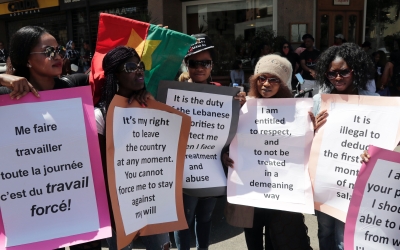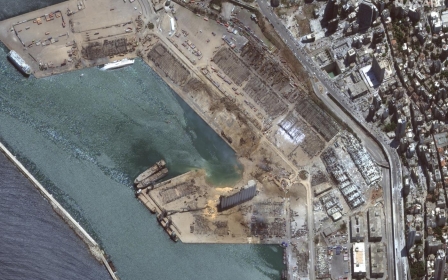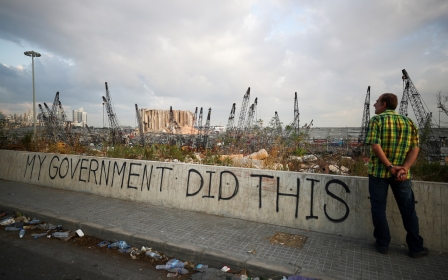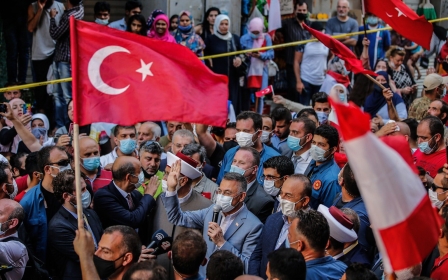Beirut explosion: Penniless and hopeless, Bangladeshi workers desperate to return home
Idris Ali was eating on the floor in a room that he shared with four other people in downtown Beirut when he heard the first blast.
Sitting cross-legged and enjoying his only meal of the day, he began to feel the shaking.
When it began, he grabbed his towel and walked towards the window to figure out what was going on.
The next moment felt like a blur. He remembers the silence before he was thrown into the air.
"I got up shaking, thinking my life was all over," recounts the migrant worker to Middle East Eye. "I then ran downstairs and just saw glass. Everyone was crying. People were bleeding."
New MEE newsletter: Jerusalem Dispatch
Sign up to get the latest insights and analysis on Israel-Palestine, alongside Turkey Unpacked and other MEE newsletters
'I still wake up shaking, thinking that my life is going to end'
- Idris Ali, migrant worker in Beirut
One week on and Ali is more desperate than ever to do one thing: go home to Bangladesh.
Having come to Lebanon with the hope of supporting his son, he was already in distress when the country's economic crisis took hold.
Ali lost his job, his home, and was unable to feed himself.
He then relied on the good will of others and ended up sleeping on the floor of a Bangladeshi domestic worker who took him and others in.
But nothing prepared him for Beirut's port explosion.
"I still wake up shaking, thinking that my life is going to end," says Ali.
"We all just sit here frozen in shock. Many Bangladeshis worked in the port and if it had happened an hour earlier, it could have been my friends. The stress of everything is making me want to leave even more."
Ali was fortunate. He did not sustain significant injuries.
Local health officials say at least 200 people have died from the explosion caused by 2,750 tonnes worth of ammonium nitrate exploding in Beirut port.
At least four Bangladeshi nationals were killed and 21 were injured in the blast, Bangladesh has confirmed. Countries including the Philippines and Pakistan have also lost citizens to the explosion.
But while Beirut attempts to rebuild itself, workers like Ali are anxious to go home, after losing both their jobs and their hope of making a living in Lebanon.
His anxiety is shared by Shahid, who was also let go by his employer due to the economic crisis.
Like Ali, he wants to leave Lebanon, but is unable to do so because he can't afford to pay for the flight back home.
"It feels like I'm living in a movie. Never in my life did I imagine going through something like this," said Shahid, who refused to give his surname due to fears for his safety.
"My boss fired me and didn't give me six months' worth of salary. He tried to pay me in Lebanese pound instead of dollars.
"But even if I had been paid, it would not have been enough for a plane ticket home to Bangladesh."
Migrant workers made homeless
While local security officials admit that many foreign workers in Beirut are now missing and unable to be identified, an aid worker estimates the port explosion has also upended the accomodation of thousands of migrants.
"Thousands are homeless and starting to live in very overcrowded housing," said Tsigerda Birhanu from the local Egna Legna, a non-profit organisation set up to support foreign workers.
Many migrant domestic workers have been expelled by their employers after the blast, and the aid worker said that as many as 15 to 20 domestic workers now find themselves living in one room.
Lebanon has nearly 250,000 migrant domestic workers who are given the right to work in the country via the kafala system, a common form of sponsorship used across the Middle East.
While workers under Lebanon's Labour Law are guaranteed certain rights, under the kafala system, if an employer ends a contract with a domestic worker - even in cases of abuse - the worker loses their migration status.
Birhanu praised how hours after the blast, hospitals had treated everyone irrespective of their nationality and for free. However, the aid worker said many migrants are unable to continue with the neccessary treatments due to costs.
"When we do outreach work we come across cases of workers who have been discharged early but still need medicine and have to visit doctors.
"But these follow up appointments mean they need money. The expense is just too high for many because of the economic crisis. Many women are not receiving treatment because they don't have money because of the crisis," Birhanu explained.
For now, Ali is trying to scrape together enough money to return home.
Bangladesh's embassy has said it will assist its nationals with repatriation, and earlier on Wednesday Bangladesh's air force brought home at least 75 workers.
Many more are desperate to go back, Ali says, but so far he has not been offered any help from the embassy.
"When so many of us Bangladeshis lost our jobs a few months ago, we received no help either," laments Ali.
"So many of us have been left hungry and mentally distraught by everything that has happened. The situation in Lebanon is bad. I just don't see any end in sight."
Middle East Eye delivers independent and unrivalled coverage and analysis of the Middle East, North Africa and beyond. To learn more about republishing this content and the associated fees, please fill out this form. More about MEE can be found here.






